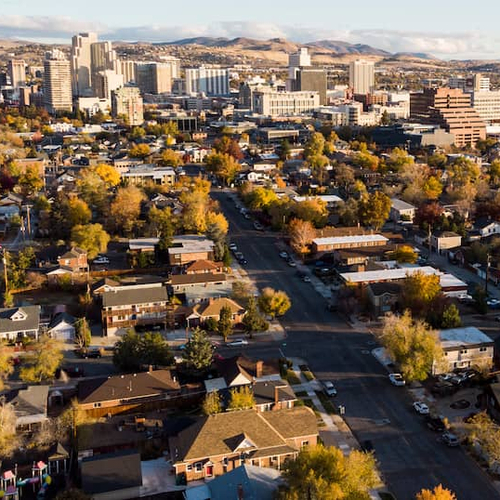How to move to another state: A step-by-step guide
Contributed by Karen Idelson
Dec 28, 2025
•7-minute read

A big move to a new state can be an exciting thing, but it’s also stressful. You’re uprooting your life and need to deal with that emotionally while physically preparing to move yourself, your family, and your belongings to a new place.
One thing that can help limit the stress of a major move is to have a checklist. Use these tips to build your checklist and give yourself the best chance of a smooth transition.
How to move to another state: Step by step
If you’re moving to a new state, follow these steps.
Step 1: Establish a moving timeline
The first step to relocating to another state is determining your moving timeline. Estimate how many weeks or months you’ll need to prepare for a move out of state. Establishing a general timeline also means deciding on your moving date. Setting a moving date early in the process helps ensure you have enough time to prepare everything before the move.
Your timeline will depend on the circumstances of your out-of-state move. For example:
- Are you relocating for work and in need of a new apartment or house?
- Did you buy a house and need to find a new job?
- Do you need to sell your property while preparing to move to a new state?
- Do you need to buy and sell a house at the same time?
Step 2: Research your new surrounding area
Before you move, make sure you do some research and due diligence on your new home to get a better sense of the community, amenities like parks, shopping, public transit, and entertainment, and other factors such as the climate and weather.
Knowing these things ahead of time can help you figure out what you need to pack or what you can leave behind. For example, if you’re moving from Alaska to Florida, you might be able to skip packing your heavy winter coats, but you will want to prioritize getting clothes for the warmer weather.
These are some of the key things to look into when moving.
- Cost of living in the new state: Consider the average cost of living in your new area. Researching the area’s cost of living can help you find an affordable property. If you’re relocating for a job opportunity, make sure your new salary reflects the area’s cost of living.
- Finding a trustworthy real estate agent: Buying a house out of state doesn’t have to feel daunting. Take it step by step, work with an experienced agent, and research your area thoroughly. Buying a home in your new location shouldn’t diverge much from the process in your current state.
- Starting the loan preapproval process early: No matter where you’re house hunting, getting preapproved for a loan at the start of your journey to buy a home is always a good idea. Getting preapproved will check one huge item off your to-do list and make your offers more appealing to sellers.
- Visiting the new area in person: There’s only so much online research can offer. To get a fuller picture, you may want to visit the area in person before moving there. Getting a feel for your new area can help make it easier to find homes and may ease some anxieties before your official moving day arrives. Plus, it gives you a chance to check out local establishments and meet new people or neighbors, so you have an idea of what to expect when you move there.
Step 3: Budget for moving expenses
Moving can be very expensive, and before you move, it’s important to budget for your moving expenses. Knowing what you can afford will help you decide between DIYing it or hiring professionals.
Some of the factors that influence moving costs include:
- Distance and mode of travel
- Number of people (and pets) moving; pet boarding costs may need to be included
- Whether the movers or the individual will manage the move
- The cost of temporary storage (if and when it is necessary)
Consider getting quotes from a few moving companies so you can get a sense of what your move will cost.
Moving company costs to move to another state
Professional movers can be a big help when relocating to a new state. Hiring a moving company may be more expensive, but a moving company can help streamline the process and ensure all your belongings make it from point A to point B.
If you want to hire professionals to help with your move, decide which services are essential. Most full-service moving companies offer local and long-distance moving and packing services or provide boxes and packing supplies.
Depending on the distance, moving across the country costs between $2,400 – $6,900 but can be more depending on how many rooms of furniture you’re taking with you. This price range usually includes complete services, like packing and transportation, for a move over 100 miles.
Of course, you can always pack your furniture and belongings yourself to save money on moving costs. Make sure the movers you hire provide out-of-state moving services. The farther away you’re moving, the more expensive it can be to hire a mover.
Truck rental costs to relocate to another state
A more affordable option than hiring professionals is to rent a moving truck and drive it yourself. Depending on how far you’re moving and where you’re moving from and to, the cost can range from $900 – $3,000.
You might also go for a middle-ground option of getting a POD or shipping container. You’ll pack all of your own stuff and unpack when it arrives, but let a professional drive your stuff to your new home for you, saving you from having to drive a moving truck a long distance.
DIY moving costs to travel across the country
Packing and moving everything yourself is the most cost-effective approach to your long-distance move, but it’s also the most labor-intensive option. If you take this route, be as prepared and organized as possible.
DIY moving costs vary, but expenses to keep in mind include packaging supplies, such as boxes, packing peanuts, bubble wrap, tape, and scissors. You’ll also need to include gas and the cost of staying in hotels and buying meals if you’re traveling across the country.
To help relieve the pressure of moving by yourself, recruit friends and family members to help with packing or transporting your belongings to your new residence.
Step 4: Start packing for your move
Once you know your budget and have a plan for how you’ll conduct your move, it’s time to start packing. Make sure to pack carefully and learn the right strategies.
For example, start with out-of-season clothing, books, and other items that you can be sure you won’t need. Also, make sure that you pack things you’ll need soon after arrival in a way that makes them easy to access.
Prep valuables and irreplaceable items
Next, carefully wrap and pack your valuable items. Consider the best methods for packing items like glassware, dishes, expensive artwork, vintage home decor, and other valuables. You may need specialty packing boxes to ensure these items are secure during the move.
As moving day draws near, begin packing personal items or belongings. Consider packing irreplaceable items, like family heirlooms or treasured photographs, to keep them with you during the move. It’s better to be cautious than risk these items getting lost or damaged.
You should also consider what you can sell, donate, or trash. Moving is the perfect excuse to clean out any boxes in an attic or basement.
Step 5: Organize and update personal information
When you move, it’s important to update all of your personal information to refer to your new address. The last thing you want is for an important document to get sent to your old address.
This can involve contacting government agencies to update your ID, reaching out to subscription services, and calling your bank. Some things to remember to do include:
- Changing your mailing address and having mail forwarded
- Obtaining a new driver’s license or ID with the new address
- Disconnecting utilities at the current address
- Updating your new address with financial institutions, lenders, doctors, insurance providers, and other key contacts
- Canceling memberships to local establishments (like gyms)
- Updating vehicle registration
- Updating voter registration
Step 6: Make final preparations before the move
The last few days before you move can feel overwhelming due to the flurry of activity, but it’s important to make your essential final preparations so that you’re ready to go on moving day.
Some important steps to take in the last days before you move include:
- Renew prescriptions
- Get an oil change or tire rotation (if their vehicle needs service)
- Unplug appliances in the home
- Defrost the refrigerator/freezer
- Clean out the refrigerator and pantry
- Clean the home
- Organize boxes for the movers
Step 7: Move out of your house
When moving day has arrived, there will still be a few final to-dos before you can say goodbye to your home. If you hired professional movers, verify that they’re the ones you hired by checking their IDs, and then sign any necessary paperwork. If you’re moving everything yourself or with help from friends, develop an efficient method to get everything out of your house. For example, you may want to start with furniture or heavier boxes.
Once the house is empty, do any last-minute cleaning and take a final walk-through. You don’t want to leave anything behind after you’ve relocated to another state. It may also be helpful to take pictures of the residence to document its appearance in case any issues arise when the new residents move in.
All that’s left to do is to ensure all the doors and windows are closed, and then you can lock up the house. You may have to hand your keys over to a real estate agent, the new owners, or your landlord before you go.
Step 8: Enjoy your new home
Moving is a high-stress situation. Once it’s all over, the last thing left to do is enjoy your new home.
Take some time to sit in your living room and enjoy the new space. You can start thinking about your future in your new home, come up with plans for decorating or arranging furniture, or explore your surroundings and find a nice restaurant or coffee shop.
The bottom line: Relocating to another state is just a move away
Moving to a new state can be a long process, and it’s normal to feel a bit stressed out. However, it can lead to an amazing new adventure if you put yourself in the right frame of mind. Have a plan and follow these steps, and you can make moving as low-stress as possible.
If you’re considering a long move and want to buy a new home, you can find out what you may qualify for by applying for a mortgage with Rocket Mortgage® today.

TJ Porter
TJ Porter has ten years of experience as a personal finance writer covering investing, banking, credit, and more.
TJ's interest in personal finance began as he looked for ways to stretch his own dollars through deals or reward points. In all of his writing, TJ aims to provide easy to understand and actionable content that can help readers make financial choices that work for them.
When he's not writing about finance, TJ enjoys games (of the video and board variety), cooking and reading.
Related resources
9-minute read
New home checklist: Everything to do before and after moving day
A checklist for moving into a new home can make for a smooth relocation. Learn everything you need to do when moving with this new home checklist.
Read more

3-minute read
When to rent vs. buy a house: Weighing the pros and cons
When relocating to a new place for a job, you have a choice between renting or buying a home. Explore the pros and cons of each approach before deciding.
Read more

7-minute read
A guide to moving cross-country
When moving across the country, there are steps you can take to help the process go smoothly. Explore our guide for tips on how to move across the country.
Read more